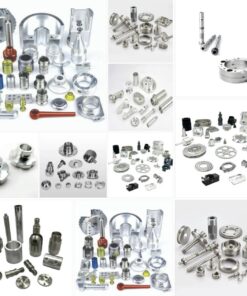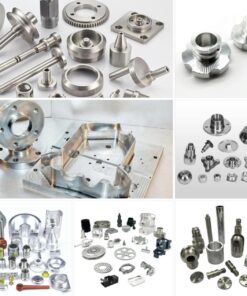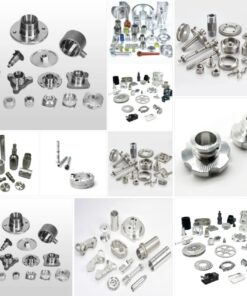Titanium Gr2 Round Bars Customized with Your Demand – Size OD45mm x 3m Length
$2,146.00
Titanium Gr2 Round Bars Customized with Your Demand – Size OD45mm x 3m Length is now in stock, competitive price, good service, fast delivery, flexible payment.
List of Materials
| Stainless | Titanium | Nickel |
| Aluminium | Copper | Steel |
| Others | ||
List of Items
| Coils/Roll | Plates/Sheets | Pipes |
| Round Bar | Hexagons | Flat Bars |
| Fiting | Wire/Rod | Square Tubes |
| Others | ||
Titanium Gr2 Round Bars Customized with Your Demand – Size OD45mm x 3m LengthSS316 1 inch x 10 feet round bar is now in stock, competitive price, good service, fast delivery, flexible payment.
| Name: Matthew |
| WhatApp/Viber: +1(972) 672-2412 |
| Mail: vnusmarket@gmail.com |
Titanium Alloys
Titanium alloys are alloys that contain a mixture of titanium and other chemical elements. Such alloys have very high tensile strength and toughness (even at extreme temperatures).
They are light in weight, have extraordinary corrosion resistance and the ability to withstand extreme temperatures.
However, the high cost of both raw materials and processing limit their use to military applications, aircraft, spacecraft, bicycles, medical devices, jewelry, highly stressed components such as connecting rods on expensive sports cars and some premium sports equipment and consumer electronics.
Properties and Applications
Following is an overview of the most frequently encountered titanium alloys and pure grades, their properties, benefits, and industry applications. For specific terminology, please see our ‘definitions’ section at the end of this page.
Commercially Pure Titanium Grades
Grade 1
Grade 1 titanium is the first of four commercially pure titanium grades. It is the softest and most ductile of these grades. It possesses the greatest formability, excellent corrosion resistance and high impact toughness.
Because of all these qualities, Grade 1 is the material of choice for any application where ease of formability is required and is commonly available as titanium plate and tubing. These include:
- Chemical processing
- Chlorate manufacturing
- Dimensional stable anodes
- Desalination
- Architecture
- Medical industry
- Marine industry
- Automotive parts
- Airframe structure
Grade 2
Grade 2 titanium is called the “workhorse” of the commercially pure titanium industry, thanks to its varied usability and wide availability. It shares many of the same qualities as Grade 1 titanium, but it is slightly stronger. Both are equally corrosion resistant.
This grade possesses good weldability, strength, ductility and formability. This makes Grade 2 titanium bar and sheet are the prime choice for many fields of applications:
- Architecture
- Power generation
- Medical industry
- Hydro-carbon processing
- Marine industry
- Exhaust pipe shrouds
- Airframe skin
- Desalination
- Chemical processing
- Chlorate manufacturing
Grade 3
- Aerospace structures
- Chemical processing
- Medical industry
- Marine industry
Grade 4
Grade 4 is known as the strongest of the four grades of commercially pure titanium. It is also known for its excellent corrosion resistance, good formability and weldability. Though it is normally used in the following industrial applications, Grade 4 has recently found a niche as a medical grade titanium. It is needed in applications in which high strength is required:- Airframe components
- Cryogenic vessels
- Heat exchangers
- CPI equipment
- Condensor tubing
- Surgical hardware
- Pickling baskets
Titanium Alloys
Grade 7
Grade 7 is mechanically and physically equivalent to Grade 2, except with the addition of the interstitial element palladium, making it an alloy. Grade 7 possesses excellent weldability and fabricality, and is the most corrosion resistance of all titanium alloys. In fact, it is most resistant to corrosion in reducing acids.
Grade 7 is used in chemical processes and production equipment components.
Grade 11
- Chemical processing
- Chlorate manufacturing
- Desalination
- Marine applications
Ti 6Al-4V (Grade 5)
Known as the “workhorse” of the titanium alloys, Ti 6Al-4V, or Grade 5 titanium, is the most commonly used of all titanium alloys. It accounts for 50 percent of total titanium usage the world over. Its usability lies in its many benefits. Ti 6Al-4V may be heat treated to increase its strength. It can be used in welded construction at service temperatures of up to 600° F. This alloy offers its high strength at a light weight, useful formability and high corrosion resistance. Ti 6AI-4V’s usability makes it the best alloy for use in several industries, like the aerospace, medical, marine and chemical processing industries. It can be used in the creation of such technical things as:- Aircraft turbines
- Engine components
- Aircraft structural components
- Aerospace fasteners
- High-performance automatic parts
- Marine applications
- Sports equipments
Ti 6AL-4V ELI (Grade 23)
- Orthopedic pins and screws
- Orthopedic cables
- Ligature clips
- Surgical staples
- Springs
- Orthodontic appliances
- In joint replacements
- Cryogenic vessels
- Bone fixation devices
Grade 12
- Shell and heat exchangers
- Hydrometallurgical applications
- Elevated temperature chemical manufacturing
- Marine and airfare components
Ti 5Al-2.5Sn
Ti 5Al-2.5Sn is a non-heat treatable alloy that can achieve good weldability with stability. It also possesses high temperature stability, high strength, good corrosion resistance and good creep resistance. Creep refers to the phenomenon of plastic strain over long periods of time, which happens at high temperatures. Ti 5Al-2.5Sn is mostly used in aircraft and airframe applications, as well as cryogenic applications.Definitions
Drop hammer method – The use of a machine consisting of an anvil or base aligned with a hammer that is raised and then dropped on molten metal, in order to forge or stamp the metal.
Ductility – A metal’s ability to be easily drawn into wire or hammered thin; easily molded or shaped.
Fabricality – Refers to a metal’s ability to be used to create machinery, structures, and other equipment, via being shaped and assembled.
Formability – A metal’s ability to be manipulated into various forms and shapes.
Hydropress Forming - The pressure exerted by a rubber press head forms a sheet of metal to the configuration of the tool – shaping the metal.
Interstitial Elements – “Impurities” found in pure metals, sometimes adding benefits to the alloy.
Press Brake Forming – A machine used to bend sheet metal into whatever form is called for.
Stretch form method – A technique in which the heated metal sheet is stretched over the mold and then cooled into shape.



















